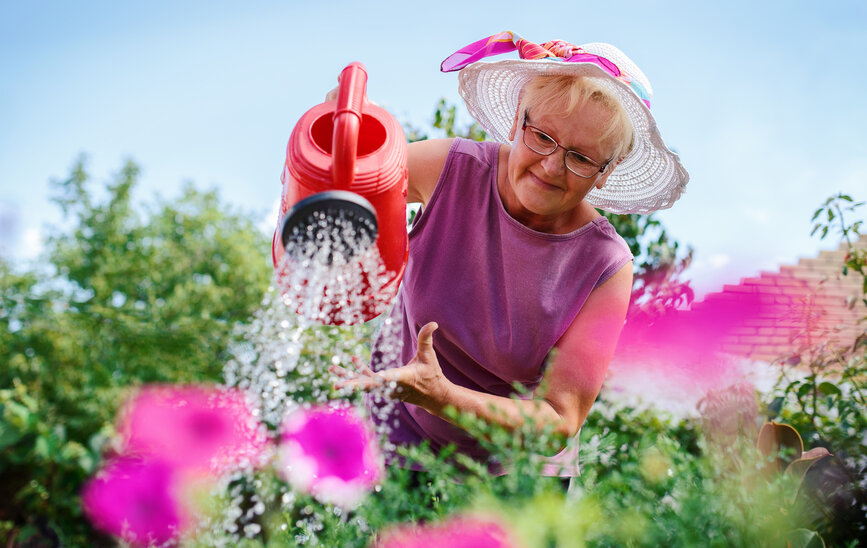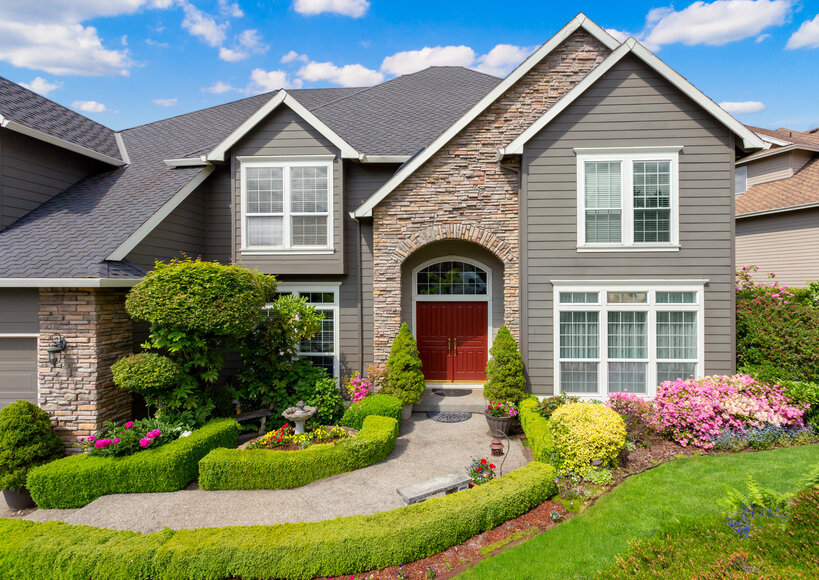

 Planting a flowerbed or vegetable patch and watching the tendrils emerge is a rewarding experience for seniors. Gardening also offers older people significant physical and emotional benefits. Tending a garden is a hobby many seniors enjoy, and here are tips to help make it safer for them.
Planting a flowerbed or vegetable patch and watching the tendrils emerge is a rewarding experience for seniors. Gardening also offers older people significant physical and emotional benefits. Tending a garden is a hobby many seniors enjoy, and here are tips to help make it safer for them.
A garden full of blooms is the result of physical effort over a period of time—from digging in soil to bending to water plants and kneeling to pull out weeds. All this hard work not only keeps the garden healthy, but it ensures the senior stays physically active, too.
Exercise Is Important
In addition to the physical health promoted by gardening, seniors gain significant emotional health benefits. Gardening gives seniors responsibility, serves as a healthy outlet for negative emotions, encourages relaxation, increases mental clarity, results in feelings of reward, and lowers stress levels.
Being out in the sun while gardening gives seniors a boost of vitamin D. Older people’s ability to synthesize vitamin D diminishes with age; more time in the sun leads to the absorption of more vitamin D. Gardening motivates seniors to spend time outdoors.
Getting Outdoors

Smiling senior woman enjoying in her garden with flowers. Hobbies and leisure
Gardening, while seemingly a solitary activity, reduces feelings of loneliness. Community gardens abound, and older gardeners have an entire season to discuss the best fertilizers with fellow gardeners. Online gardening groups and local gardening clubs also welcome green thumbs of every age.
In order to experience the maximum benefits from gardening, seniors are encouraged to practice safety tips and make this healthy activity easier for themselves. When older people decide to pursue gardening in a backyard plot, the following gardening tips will be helpful.
Tip 1: Clear Walkways
Debris haphazardly strewn on the walking paths toward the garden are a trip hazard. Remove the debris to prevent falls and subsequent injuries. The path should remain clear. Consider building a walkway with large stones so that the senior does not feel compelled to navigate on uneven grassy areas.
Tip 2: Wear Sunscreen
Green thumbs might spend hours under the sun immersed in gardening activities. While an ample amount of sunlight is healthy, too much sun can cause sun burns (aging skin is more susceptible to sun burns). Wear sunscreen and a wide brimmed hat while working in the garden.
Tip 3: Hydrate
Just as plants need an abundant amount of water, seniors need to stay hydrated. Especially on hot days, seniors can become dehydrated (aging people are more vulnerable to dehydration). The elderly are advised to drink plenty of liquids while working in the garden or limit time under the hot sun.
Tip 4: Use Ergonomic Tools
Handling some gardening tools can be cumbersome for seniors with arthritis, Parkinson’s disease or mobility issues. The solution is to purchase tools that are lightweight and offer ergonomic features, like larger handles and a nonslip grip. Avoid power tools and opt for manual ones.
Tip 5: Break Up Time Gardening
Seniors are advised to divide up time spent in the garden. Rather than spend an entire hour in the garden at once, devote 20 minutes in the garden three to four times per day. Divvying up time in the garden prevents seniors from heat exhaustion, muscle overuse, and overtaxed joints.
Tip 6: Wear a Garden Tool Apron
Gardening may require keeping a few tools on hand: gloves, spades, and seed packets, for instance. Older gardeners who wear a garden tool apron have immediate access to these tools, which are placed into the pockets of the apron. Once gardening is done, the apron can be conveniently hung up.
Tip 7: Carry a Smartphone
A smartphone can be a lifesaver if an older person slips and falls outside while gardening. Seniors are urged to carry one at all times. An elderly gardener may never need to use it, but in the event of a fall, the phone can be used to call for help.
Tip 8: Use a Mobility Tool
Walking on uneven ground calls for additional support, such as a cane, walking stick, or walker. Plus, if the elderly person falls, a cane will make it easier to get back up. Consider ski poles, which can be alternately used as a gardening cane or to pick up trash.
Tip 9: Invest in a Raised Planter Bed
Raise the garden to waist level to avoid the pain of lifting, bending, or digging the ground below. A raised planter bed allows seniors to experience the joys of gardening without feeling the pain of arthritis. Stacked bricks or concrete blocks can raise the bed two or three feet higher.
Tip 10: Accept Help
Certain gardening tasks are too difficult for aging people to do. Rather than strain the muscles and risk injury, seniors are encouraged to ask a neighbor or professional caregiver for assistance. Trade some gardening knowledge for the extra help, and both the senior and neighbor will benefit.
Gardening can be enjoyed as a solitary pursuit or in the company of gardeners. When the green thumb in your life needs extra support at home or in the garden, turn to Assisting Hands Home Care. We are a recognized leader in elder care and fulfill seniors’ nonmedical care needs.
Our senior home care services are comprehensive. We offer invaluable companion care services, which include help with all the activities of daily living. Caregivers assist seniors with personal hygiene tasks, transportation, grocery shopping, meal preparation, and medication reminders. We are pleasant companions to seniors, keeping loneliness at bay.
We also provide fall risk assessments, which include assessing the inside of the home and the immediate outside vicinity for potential hazards. Our experienced caregivers will ensure the pathway to the garden is safe for elderly individuals to walk over.
Assisting Hands Home Care services are prized by families with elderly loved ones living in Palos Heights, Illinois. Our compassion in and dedication to serving the aging population ensure seniors live fulfilled and dignified lives. Call to schedule an in-home consultation and start quality elder care today.
